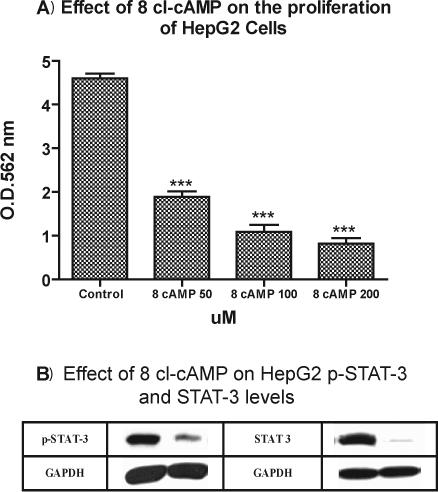Figure 7A.

Effects of 8-chloro-cAMP on HepG2 cells proliferation. 8-chloro-cAMP dose-dependently attenuated the proliferation of HepG2 cells. HepG2 cells were 30−50% confluent at the time of treatment. Cells were treated with 8-chloro-cAMP at doses of 50, 100 and 200 uM. Cellular proliferation was measured at 72 hours by using the Vybrant MTT Cell Proliferation Assay Kit. Data is expressed as the mean ± SEM, N = 4 and ***ρ< 0.001 for all concentrations of 8-chloro-cAMP versus untreated cells.
Figures 7B: Western blot analysis shows that 8-Cl-cAMP 200 uM decreased pSTAT-3 protein expressions of HepG2 by 73% at 1 hour as compared to untreated cells and STAT-3 by 89% at 72 hours as compared to untreated cells. Western blot analysis were performed as described earlier. Briefly, HepG2 cells were cultured in 24 well plates at density of 5 × 105 cells/well for 2 days, treated with 8-Cl-cAMP 200 uM and were collected at the indicated time points in each experiment. Cell lysates were immunoblotted to detect (pSTAT-3), STAT-3, and GAPDH.
